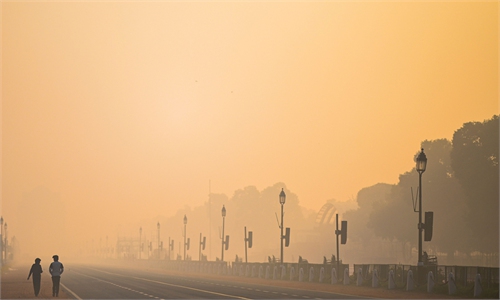Air pollution still a killer in Europe
Fine particles causing 300,000 premature deaths a year

Activists from the climate protest group Extinction Rebellion carry out a performance with 26 shoes, representing the people who die from air pollution in London each day, outside the Transport For London offices in Stratford in southeast London on August 31, 2020. Photo: AFP
Premature deaths caused by fine particle air pollution have fallen 10 percent annually across Europe, but the invisible killer still accounts for 307,000 premature deaths a year, the European Environment Agency (EEA) said Monday.If the latest air quality guidelines from the World Health Organization (WHO) were followed by European Union (EU) members, the latest number of fatalities recorded in 2019 could be cut in half, according to an EEA report.
Deaths linked to fine particular matter - with a diameter below 2.5 micrometers or PM2.5 - were estimated at 346,000 for 2018.
The clear reduction in deaths for the following year were put down partly to favorable weather but above all to a progressive improvement in air quality across the continent, the EU's air pollution data center said.
In the early 1990s, fine particles, which penetrate deeply into the lungs, led to nearly a million premature deaths in the 27 EU member nations, according to the report.
That figure had been more than halved to 450,000 by 2005.
In 2019, fine particulate matter caused 53,800 premature deaths in Germany, 49,900 in Italy, 29,800 in France and 23,300 in Spain.
The EEA also registers premature deaths linked to two other leading pollutants, but says it does not count them in its overall toll to avoid doubling up.
Deaths caused by nitrogen dioxide - mainly from cars, trucks and thermal power stations - fell by a quarter to 40,000 between 2018 and 2019.
Fatalities linked to ground-level ozone in 2019 also dropped 13 percent to 16,800 dead.
Heart disease and strokes cause most premature deaths blamed on air pollution, followed by lung ailments including cancer.
Even if the situation is improving, the EEA warned in September that most EU countries were still above the recommended pollution limits, be they European guidelines or more ambitious WHO targets.
In September, the alarming statistics led the WHO to tighten its recommended limits on major air pollutants for the first time since 2005.
"Investing in cleaner heating, mobility, agriculture and industry improves health, productivity and quality of life for all Europeans, and particularly the most vulnerable," said EEA director Hans Bruyninck.
AFP



